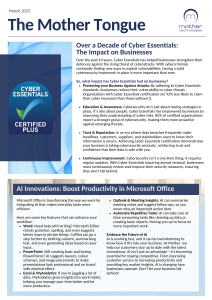Charities are under growing pressure as they are increasingly being targeted by cybercriminals. In 2023, around 785,000 cybercrimes were committed against charities in the UK. Around 24% of charities experienced some sort of cyber attack, and those with annual revenue over £500,000 reported more instances of 56% (Gov.UK, 2023).
Charities may face several cyber threats including ransomware, malware, data breaches, and the most common being phishing with 56% of charities identifying them as the most common threat. This was followed by people impersonating their organisation or staff in emails or online.
The consequences of a cyberattack on a charity can be drastic. Firstly, dealing with cyberattacks is costly. There are direct financial losses which can come from theft of unauthorised persons having access to bank accounts. Additionally, if a ransomware attack occurs, attackers may demand ransom payments to restore systems and access to data.
Secondly, there are incident response costs. Not only does your business have to pay support costs to recover from the breach and improve cybersecurity infrastructure, but a lot of the time charities will also have to be audited by an external party for their stakeholders to continue working with them. This can cost thousands to pass the auditing process and get operations back to normal.
Alongside these costs, there is productivity loss and service interruptions. Cyberattacks may result in employees being unable to work, leading to reduced efficiency or even the halt of complete operations.
Next, there is reputational damage. Charities often must disclose that a cyberattack has occurred within their organisation. This can lead to a loss of trust from supporters, donors, volunteers, and other charity stakeholders, significantly impacting the charity’s future.
Comprehensive Security Measures: To maximise protection for your business, it’s crucial to implement a comprehensive array of security solutions. Relying on a single solution is insufficient; instead, a suite of solutions is necessary to defend against evolving threats. Mother’s RoundClock Security Suite addresses all seven essential components of cybersecurity, ensuring that no aspect of your charity is left vulnerable.
Staff Training: Human error plays a significant role in cybersecurity incidents, accounting for nearly a quarter of all such incidents in the UK in 2023. These incidents often stem from employees responding to phishing attacks, accidental data leaks, and other unintentional actions. To mitigate these risks, it is crucial to provide employees with regular training and ensure they are up to date with the latest cyber threats. This proactive approach helps prevent successful social engineering and phishing attacks, significantly enhancing the organisation’s overall security posture.
Robust Password Policies: Passwords are key for protecting all accounts. However, they are especially vulnerable to threats. Therefore, all employees should be encouraged to use best password practices. For guidance, refer to our steps for creating a robust password. However, with the rise of AI and the advancement of threats, strong passwords alone are no longer sufficient. Charities should implement two-factor authentication (2FA) for an extra layer of protection. This ensures that even if passwords are compromised, hackers cannot bypass the second method of verification, thereby safeguarding your charity’s accounts.
Regular Backups: Back up your data regularly and store it securely to reduce the damaging effects of ransomware attacks. Effective disaster recovery and backup solutions help your organisation recover quickly and efficiently, reducing downtime and ensuring operational continuity.
Resource Constraints: With charities trying to save as much money as possible to put towards achieving their mission, budgets can be tight. Consequently, many do not invest enough in robust cybersecurity measures. However, neglecting these measures can lead to much greater costs in the long run, including financial losses, operational disruptions, and reputational damage. Charities must recognise that a proactive investment in cybersecurity is essential to protect their operations, data, and stakeholders.
Many charities either lack an internal IT team or have a very small one. This often means they cannot stay updated with the latest security threats and necessary countermeasures. Partnering with a MSP like Mother can alleviate this burden. We take the stress out of implementing and maintaining robust cybersecurity measures by providing our customers with the latest and most innovative solutions, ensuring their digital security is always up to date.
Legacy Systems: Many charities have relied on the same IT systems for years, resulting in staff familiarity and a reluctance to change. However, these outdated systems often lack modern security features, making them more vulnerable to cyber attacks. While updating these systems may cause some initial inconvenience, it is essential for protecting sensitive data and maintaining the charity’s operational integrity. Investing in current technology is a critical step towards ensuring robust cybersecurity and safeguarding against potential threats.
Cyberattacks on charities can cause serious financial, operational, and reputational damage. To protect against these threats, charities should use comprehensive security measures like Mother’s RoundClock Security Suite, train staff regularly, enforce strong password policies, and back up data frequently. Despite budget limits and outdated systems, investing in modern cybersecurity and working with managed service providers is crucial for safeguarding the charity’s mission and operations.

Read the newest edition of The Mother Tongue, packed with fresh tech insights and company updates.
